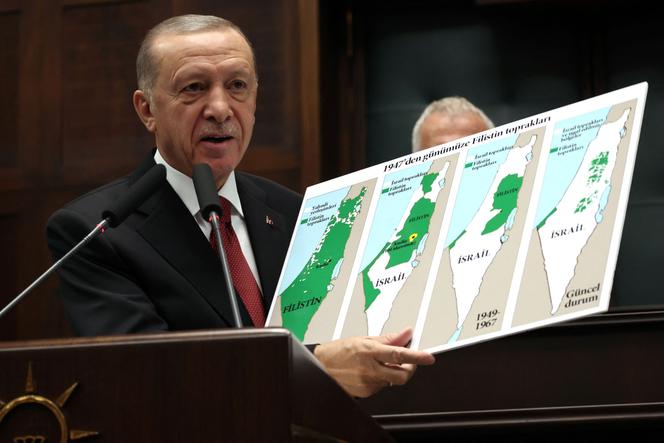


The balancing act required by diplomacy is a difficult art, and to be efficient, it often involves going back on one's word. Turkish President Recep Tayyip Erdogan knows all about this. Since the brutal Hamas attack on Israel on October 7, the head of state and his ruling Justice and Development Party (AKP) have sought to carefully gauge their support for the Palestinian cause, while avoiding any deterioration in relations with the Israeli authorities, with whom Turkey embarked on a normalization process just a few months ago. At the end of September, the Turkish president met Prime Minister Benjamin Netanyahu, in New York, for the first time after more than a decade of tension.
In the first days following the offensive, Erdogan, who maintains close contacts with Hamas political leaders, initially and surprisingly held back, adopting a tone of de-escalation. He repeated what he had said on several occasions: "The priority for peace and stability in the whole region is the creation of an independent Palestinian state with East Jerusalem as its capital within the 1967 borders, based on UN criteria." He also made a pointed criticism of the United States and the dispatch of two aircraft carriers to the area. "What are you doing here?" he scolded.
After the explosion at the Al Ahli Arab Hospital in the Gaza Strip, the Turkish president spoke up. He immediately attributed responsibility for the bombing to the Israeli army and described the shelling of the enclave as an attack devoid of the most fundamental human values. Three days of mourning were declared throughout Turkey. Foreign Minister Hakan Fidan, on a tour of the region, denounced Israel's "barbaric attacks." In a searing speech to members of the Ankara parliament on Wednesday, October 25, Erdogan announced he was canceling his plans to visit Israel pointing to the inability of the West to stop the war. "Relations could have been different [with Netanyahu] but that will no longer happen," Erdogan insisted, before saying, "Hamas is not a terrorist organization, but a group of liberators and mujahideen who are fighting to protect their land."
To understand this verbal escalation, which is typical of the Turkish president and which is essentially him responding to the need not to alienate his traditional and profoundly anti-Zionist electorate, we need to back in time a few days. In keeping with Turkey's desire to play an active role in resolving regional crises and to avoid appearing too much like a shadowy sponsor of Hamas leaders, Ankara very discreetly asked Ismail Haniyeh, the leader of the Islamic resistance group, who was in Istanbul at the time of the attack on October 7, to leave the country with his entourage, as first revealed by the news outlet Al-Monitor. The report was first denied by Ankara on Monday, October 23, in a statement in Arabic issued by the Center for Countering Disinformation, a department attached to the president, before the same facts were reported by other news organizations citing several different sources. The Palestinian leader and his family have reportedly not been on Turkish soil in recent days.
You have 56.91% of this article left to read. The rest is for subscribers only.
